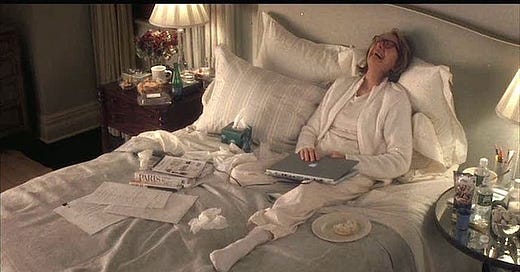In January, our city burned. An evacuation warning was issued in our neighborhood, the invisible parameter ending a few blocks north of our home. Adam packed — our marriage license, my grandparents’ photo albums — while I bathed Leo in the next room. The Palisades and Eaton fires had decimated nearby communities one day earlier, and destruction seemed both entirely possible and unimaginable. I looked around our house, wondering if this new blaze — the Sunset Fire — would engulf it, too. The next morning, I drove south to Orange County, strapping Leo into his car seat beneath burnt cotton candy clouds, the hazy air stinging my eyes.
In February, Leo stopped sleeping. After weeks of worry about the air quality and frenzied group chats with other moms re-sharing the same warnings from pediatricians and AQI reports — all of us, suddenly, experts — we returned to Los Angeles. Back at home, it was hard to pinpoint the cause of Leo’s sleep regression: congestion, or teething, or confusion after weeks spent in a different environment. Each night was the same: he woke, crying, around 11pm. I worked with a sleep consultant who sent me a spreadsheet, an equation coded into the cells that would help me calculate his optimal nap and bedtimes. I tracked his sleep like it was my job, worried that a difference of ten minutes here or there would derail all progress.
Sleep deprived and foggy, I sat down to write this newsletter multiple times and then thought, what if I just…didn’t? My son’s sleep, while entirely all-consuming to me, felt utterly unoriginal and boring to talk about, like so much else in motherhood. And the fires, while traumatic and earth shattering, had not destroyed my home. Adding my voice to the collective conversation about them felt self-serving and opportunistic.
I began to view content — articles, essays, Instagram captions — through a pessimistic lens, annoyed by a culture in which we overshare and mine our lives for material. Did we need to post about everything? Or: if everyone else was writing about everything, what did I have to add to the conversation? It had all been said already, and I felt too burned out to think of anything new to add.
There is a concept known as “the good enough parent,” popularized by psychoanalyst Donald Winnicott in the 1950s. The idea emphasizes that parents don't need to be perfect to raise healthy children; instead, they can accept that they will inevitably make mistakes while striving for responsiveness and empathy. It’s a term that I find comforting in theory, but my inner perfectionist recoils. To me, anyone who says they aren’t striving for perfection in at least one area of their life — parenthood, career, body, relationships — must be lying. When I feel like I’m not doing something perfectly, I struggle with how — or whether — to attempt it at all. What’s the point? Take this Substack, for instance. Since I launched three years ago, countless other writers have created newsletters. There are unlimited essays on sobriety, motherhood, life, and culture. I’m not the shiniest newsletter on the block; I don’t have fancy branding or hundreds of thousands of subscribers. I don’t always have something new to say every week so, maybe, I should just stop writing it altogether.
And for a while, I did. But as I started thinking more about the idea of “good enough” parenting, I started applying the concept to other areas of my life, too. What if I just made a “good enough” lunch for myself that wasn’t beautiful or Instagram-worthy but was still healthy and tasted good? What if, instead of waiting for 45 uninterrupted minutes to call and catch up with a friend, we spoke for 10? Good enough; better than nothing. And what if, instead of spending time overthinking and editing and comparing and worrying about cadence or tone or if I was original enough, I just let myself write?
In March, we got two goldfish. “Ishy,” Leo called them, pointing at the orange fish as they swam around their tank. After two weeks, I returned home to find one of the fish floating lifelessly, bloated and grey, eyes still open. I was illogically startled by the sight — goldfish die, and often — and instinctively wondered what we had done wrong. The next day, Adam came home with plastic bag in hand, new fish in tow. “Ishy,” Leo exclaimed. We didn’t have to overanalyze the causes. We could just keep it moving with our next attempt.
Leo started sleeping, then stopped again. Molars, or separation anxiety, or the 18 month sleep regression. The city started to heal, rain came, group chats agreed it was safe to let our kids play outside. And I started to write again. None of it is perfect, but it’s good enough.
also, two book recs from this month: The Power Pause, by Neha Ruch, a refreshing take on career breaks after having kids, and The Tell, by Amy Griffin, a stunning memoir on the power of facing our secrets. Highly recommend both!
xx
Sarah






Ahhh... Good enough indeed. I'm in Santa Barbara and remember the Thomas fire and debris flow of a few years ago. That wasn't near the devastation you all had... My heart aches for L.A. I'm so glad you and your family are safe.